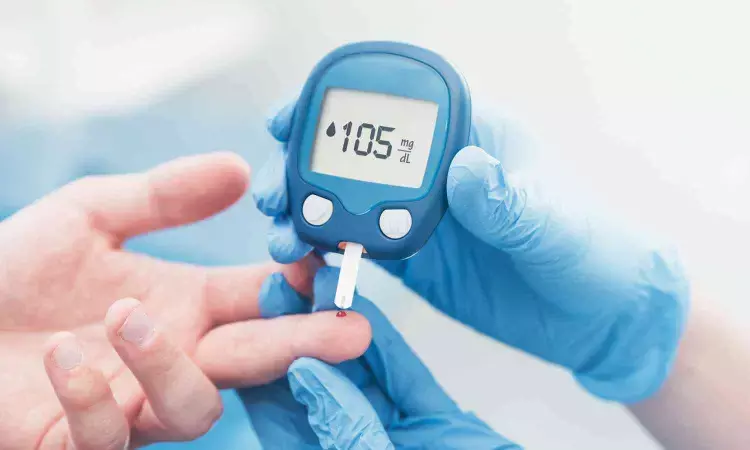- Home
- Medical news & Guidelines
- Anesthesiology
- Cardiology and CTVS
- Critical Care
- Dentistry
- Dermatology
- Diabetes and Endocrinology
- ENT
- Gastroenterology
- Medicine
- Nephrology
- Neurology
- Obstretics-Gynaecology
- Oncology
- Ophthalmology
- Orthopaedics
- Pediatrics-Neonatology
- Psychiatry
- Pulmonology
- Radiology
- Surgery
- Urology
- Laboratory Medicine
- Diet
- Nursing
- Paramedical
- Physiotherapy
- Health news
- Fact Check
- Bone Health Fact Check
- Brain Health Fact Check
- Cancer Related Fact Check
- Child Care Fact Check
- Dental and oral health fact check
- Diabetes and metabolic health fact check
- Diet and Nutrition Fact Check
- Eye and ENT Care Fact Check
- Fitness fact check
- Gut health fact check
- Heart health fact check
- Kidney health fact check
- Medical education fact check
- Men's health fact check
- Respiratory fact check
- Skin and hair care fact check
- Vaccine and Immunization fact check
- Women's health fact check
- AYUSH
- State News
- Andaman and Nicobar Islands
- Andhra Pradesh
- Arunachal Pradesh
- Assam
- Bihar
- Chandigarh
- Chattisgarh
- Dadra and Nagar Haveli
- Daman and Diu
- Delhi
- Goa
- Gujarat
- Haryana
- Himachal Pradesh
- Jammu & Kashmir
- Jharkhand
- Karnataka
- Kerala
- Ladakh
- Lakshadweep
- Madhya Pradesh
- Maharashtra
- Manipur
- Meghalaya
- Mizoram
- Nagaland
- Odisha
- Puducherry
- Punjab
- Rajasthan
- Sikkim
- Tamil Nadu
- Telangana
- Tripura
- Uttar Pradesh
- Uttrakhand
- West Bengal
- Medical Education
- Industry
Diabetic Patients Should Undergo Dental Check-ups Once a Year: ADA Standard of Care Diabetes 2025 Guidelines

USA: Individuals with diabetes should undergo a dental examination at least once a year the newly released Standard of Care in Diabetes - 2025 American Diabetes Association (ADA) guidelines has recommended.
A new subsection, "Dental Care" was added in this recently released ADA guidelines which includes two recommendations. Recommendation 4.15 states, "People with diabetes should be referred for a dental exam at least once per year", and the second recommendation 4.16 stresses on, "Coordinate efforts between the medical and dental teams to appropriately adjust glucose-lowering medication and treatment plans prior to and in the post–dental procedure period as needed."
The ADA updates its Standards of Care guidelines annually incorporating the latest research and clinical trials, it provides strategies for diagnosing and treating diabetes in youth and adults, preventing type 2 diabetes and related conditions like obesity, and offering care recommendations to improve health outcomes.
Periodontal disease is more severe and prevalent in individuals with diabetes, often linked to higher A1C levels and adverse diabetes outcomes. Evidence suggests that periodontal treatment, such as subgingival instrumentation, can improve glycemic outcomes, as demonstrated in a randomized controlled trial showing better A1C levels (8.3% vs. 7.8%) and reduced inflammatory markers after 12 months of intensive periodontal treatment.
The guidelines recommend early detection of oral health issues, coordination between dental professionals and the diabetes care team, and inclusion of dental history in clinical evaluations. Dental professionals should be informed about patients' glycemic goals, medications, and comorbidities, as elevated A1C levels may impair oral healing. Awareness of hepatic, renal, and pulmonary conditions is vital for appropriate antibiotic and medication dosing.
For patients on insulin, sulfonylureas, or meglitinides, coordination between dental and medical teams is crucial to prevent hypoglycemia during dental procedures. This includes creating prevention plans, adjusting medications, monitoring blood glucose, and treating hypoglycemia as needed. Dental professionals should have access to blood glucose monitors, carbohydrates, and glucagon during procedures to ensure patient safety.
The ADA's Standards of Care in Diabetes—2025 guidelines underscore the significant role of dental care in the comprehensive management of diabetes. By integrating dental health professionals into the diabetes care team, the guidelines aim to address the increased risk and severity of periodontal disease in individuals with diabetes, improve glycemic control through timely interventions, and enhance overall health outcomes.
Reference:
- American Diabetes Association Professional Practice Committee. 4. Comprehensive Medical Evaluation and Assessment of Comorbidities: Standards of Care in Diabetes-2025. Diabetes Care. 2025 Jan 1;48(Supplement_1):S59-S85. doi: 10.2337/dc25-S004. PMID: 39651988; PMCID: PMC11635044.
- American Diabetes Association Professional Practice Committee. Summary of revisions: Standards of Care in Diabetes—2025. Diabetes Care 2025;48(Suppl. 1):S6–S13.
- D’Aiuto F, Gkranias N, Bhowruth D, et al.; TASTE Group. Systemic effects of periodontitis treatment in patients with type 2 diabetes: a 12 month, single-centre, investigator-masked, randomised trial. Lancet Diabetes Endocrinol 2018;6: 954–965.
BDS, MDS(orthodontics)
Dr. Garima Soni holds a BDS (Bachelor of Dental Surgery) from Government Dental College, Raipur, Chhattisgarh, and an MDS (Master of Dental Surgery) specializing in Orthodontics and Dentofacial Orthopedics from Maitri College of Dentistry and Research Centre. At medical dialogues she focuses on dental news and dental and medical fact checks against medical/dental mis/disinformation
Dr Kamal Kant Kohli-MBBS, DTCD- a chest specialist with more than 30 years of practice and a flair for writing clinical articles, Dr Kamal Kant Kohli joined Medical Dialogues as a Chief Editor of Medical News. Besides writing articles, as an editor, he proofreads and verifies all the medical content published on Medical Dialogues including those coming from journals, studies,medical conferences,guidelines etc. Email: drkohli@medicaldialogues.in. Contact no. 011-43720751


